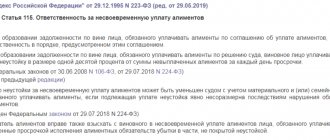Types of sanctions for non-payment of material maintenance
Refusal to contribute financial support for minors or disabled citizens entails liability as provided for by law. Measures vary depending on the severity of the offense. In 2018, the following options are provided:
- civil law;
- administrative;
- criminal
Important! Each type of punishment cannot be applied without the request of the recoverer or the initiative of the bailiff.
A penalty is applied as a civil liability. For alimony payers, a standard option is provided - 0.5% for each day of non-payment. The recipient initiates the deduction of the penalty independently. The application is submitted to the district or city court. To apply civil liability measures, it is necessary to prove the fact of intentional evasion of duties.
The articles under which it is possible to bring a violator to administrative responsibility vary depending on the family ties of the payer and the recipient. These include:
- Part 1 art. 5.35.1 Code of Administrative Offenses of the Russian Federation - in case of refusal of financial support for a minor. It does not matter whether the recipients are the child support provider's children or brothers/sisters.
- Part 2 art. 5.35.1 Code of Administrative Offenses of the Russian Federation - in case of refusal of financial support from parents. Punishment is applied if the recipients are blood parents or adoptive parents who have properly fulfilled their parental responsibilities and have not been deprived of their rights or suspended from performing the duties of an adoptive parent due to the fault of the recipient.
- Art. 17.14 of the Code of Administrative Offenses of the Russian Federation - in case of refusal to make payments in relation to any relative. The initiator of bringing to responsibility is the bailiff.
- Part 2 art. 67.1 of the Code of Administrative Offenses of the Russian Federation - when debt accumulates in an amount of at least 10 thousand rubles.
- Art. 67 of the Code of Administrative Offenses of the Russian Federation - when alimony debt accumulates from 10 thousand rubles. and more.
Criminal liability for persons evading financial support is provided for in the presence of the fact of malicious evasion. The penalty is applied exclusively in cases of refusal to support a minor child. The punishment is regulated by Art. 157 of the Criminal Code of the Russian Federation. The maximum penalty is imprisonment for a term of up to 12 months.
When do you need to support your parents?
You will probably be very surprised, but the Family Code (FC RF) also provides for the obligation of the younger generation to support the “disabled and in need of help” of the older generation.
However, this norm can be neglected if the parents were previously deprived of their rights. In addition, if the court finds that the “ancestors” did not fulfill their duties (but were not deprived of their rights), then the children can also be released from their maintenance.
Guilty actions of the alimony payer and measures of liability
One of the important conditions for qualifying a crime under Art. 157 of the Criminal Code of the Russian Federation is the intent to evade making payments to the recipient’s account and the conscious adoption of measures to conceal income and property. In this regard, the onset of liability arises depending on the guilty actions of the alimony obligee:
- non-payment for reasons beyond the control of the citizen;
- deliberate malicious evasion of financial support.
If the debt arose without the debtor’s guilty actions, the person has the opportunity to prove his innocence in court. The court may cancel the penalties applied (penalty or ban on leaving the country) and reduce the amount of debt or remove it in full.
If liability measures were applied repeatedly, but the desired measures were not achieved, then the person is considered a willful defaulter. In this case, the citizen may be held criminally liable.
Signs of malicious evasion
Criminal penalties for non-payment arise only in cases where the maliciousness of the evasion from depositing funds is proven. Malicious evasion is understood as an unmotivated refusal to provide financial support to a minor or disabled relative.
A prerequisite is the collection of financial support in the manner prescribed by law. The Family Code provides three options for collecting funds for persons in need of financial support:
- Notarial agreement.
- Performance list.
- Court order.
If a citizen refuses to voluntarily execute a court decision or a notarial agreement, the document is sent by the claimant to the FSSP to initiate enforcement proceedings. The result of the activities of the SSP is the forced withholding of unpaid financial support for the recipient.
Important! It is impossible to bring to criminal liability a person against whom enforcement proceedings have not been initiated. The recipient must first take all possible measures to recover in full.
In order to qualify evasion as malicious, there must be a combination and/or repetition of illegal actions. Evasion is considered malicious if the debtor:
- change of place of actual residence, secret from the SSP;
- providing false information about income;
- concealment of data on the presence of valuable property;
- repeated bringing to administrative responsibility;
- hiding information about your location;
- refusal of official employment;
- refusal to register with the Center for Significance;
- the period of evasion is at least 4 months.
After the initiation of enforcement proceedings, the debtor is obliged to inform the SSP about a change of residence. If information about the move is concealed and there is no information about the residence of the person liable for alimony, the bailiff is obliged to put him on the wanted list.
The amount of payments for relatives is often set as a percentage of all types of income of the payer. Therefore, it is of particular importance to provide bailiffs with complete information about all types of earnings, pensions and other types of income.
If it is impossible to withhold funds from a citizen’s income, the penalty is applied to the person’s valuable property. This includes bank accounts and deposits, securities and shares, movable and immovable property, luxury goods (jewelry, furs), household appliances, television and video equipment, gadgets (tablet computer, smartphone). Concealing information about the availability of property is a violation.
Bringing to administrative liability is possible simultaneously under several articles of the Code of Administrative Offences. However, repeated prosecution is considered repeated during the period of the previous punishment.
Financial support for relatives can only be deducted from official income. Hiding information about employment or refusing to look for a job is a way to evade payments. If there are no vacancies in the locality suitable for the debtor, the person is obliged to contact the Employment Center to register as unemployed. The employment center assigns payment of a monthly benefit, which also includes alimony.
The law differentiates the severity of evasion depending on the duration. If funds are not paid within a period of up to 2 months, the person will be held administratively liable. In the absence of financial support for at least 4 months, a citizen may be subject to criminal liability. Such evasion without good reason is malicious.
Reasons for exemption from liability for non-payment of financial support
If the ex-husband does not pay alimony, what happens to him? It all depends on the presence of culpable acts. In the absence of malicious intent, the formation of debt may occur as a result of a special situation in the life of the debtor.
If there are good reasons, the person obligated for alimony has the right to apply to the court to reduce the amount of the mortgage or write it off completely.
The main reason for canceling debt and penalties is an emergency. Actions of force majeure include:
- weather events (natural disasters);
- man-made accident;
- terrorist operations;
- fighting.
In the event of an emergency, there are no culpable actions of the citizen in the formation of the debt.
Important! The debt is not written off automatically.
The debtor has the right to file a claim in court to reduce the amount or completely write off the debt. As evidence, it is necessary to provide information about the reasons that served as the basis for the formation of the debt. The court decision must be transferred to the SSP to adjust the amount.
When should you support your ex-spouses?
We open the RF IC. Article 90. And let’s see when the former other halves have the right to receive maintenance from the first halves:
- During pregnancy and three years after the birth of the child. It is even clarified that this only applies to women.
- A disabled spouse who became disabled either during the marriage or within one year after the divorce. (You can’t call a good deal a “marriage.”)
- A needy ex-spouse of retirement or pre-retirement age.
These obligations terminate in the event of: the spouse receiving assistance entering into a new marriage, the expiration of the period established in paragraph 1, or death.
So, we have looked at: what alimony is, who, when and to whom, and most importantly, why it should be paid. And now let’s move on to the most interesting thing - what kind of responsibility awaits the alimony worker if he voluntarily does not want to fulfill his civic duty.
What is the penalty for failure to pay child support?
For debtors for the financial support of relatives, measures are provided that vary in application:
- penalties for non-payment of alimony, which can be used exclusively at the initiative of the claimant;
- liability for non-payment, which is mandatory.
Penalties initiated by the recipient of funds include:
- penalty;
- fine;
- compulsory work;
- administrative arrest;
- deprivation of parental rights;
- arrest;
- forced/corrective labor;
- deprivation of liberty.
The listed penalties can be applied to the person liable for alimony only at the request of the recipient of the funds.
The fine, which is imposed at the request of the claimant, cannot exceed 10 thousand rubles. The possibility of applying penalties is considered by the KDN and the PO.
Important! The fine is applied exclusively in cases where it is impossible to impose other penalties (compulsory labor or administrative arrest).
The maximum period for mandatory work is 150 hours. The debtor serves his sentence at his place of permanent employment. In the absence of an official place of work, a person cannot be subject to such punishment, so it is replaced with an alternative one.
Administrative arrest is currently not implemented in all regions of the country. The main reason is the lack of specialized organizations for short-term detention of violators. The period for bringing to justice is from 10 to 15 days. The listed penalties apply exclusively to persons who evade payments to children or parents.
Deprivation of parental rights is a special measure of responsibility intended only for parents. The initiator of deprivation may be the child’s legal representative or the body responsible for protecting the children’s interests. Restoration of rights is possible upon repayment of the debt. An exception is the situation if 6 months after the deprivation the minor was adopted. In this case, the return of the child to the birth family is impossible.
The arrest provided for by the Criminal Code, unlike the administrative one, has a longer duration. The period of detention can be up to three months. Forced or corrective labor for persons who refuse to pay the debt for the maintenance of minor children is applied for a period of up to 12 months. The citizen serves his sentence at the place of his main employment. In the absence of official work, a person performs socially useful work.
Imprisonment is applied to debtors who maliciously evade the obligation to provide financial support for children. The maximum prison term is 12 months.
What punishment for non-payment of alimony is applied without the participation of the claimant? Mandatory liability applied to the debtor:
- seizure of a bank account;
- seizure of property;
- deprivation of driver's license;
- restriction of travel outside the territory of the Russian Federation;
- fine.
The seizure of a bank account is applied by the bailiff without warning or initiative from the creditor. The executor sends to the credit organizations in which the debtor's accounts are opened a resolution to seize the accounts.
The amount of debt is written off from them automatically. If there is a shortage of funds, the balance of the debt remains in the account. When you top up your account, the money goes towards repayment.
Important! If the payer has 2 or more accounts in one bank, then the amount of debt will be billed for each. Example. With a total debt of 300,000 rubles, if there are 2 bank accounts, the total amount of debt will be displayed as 600,000 rubles. Debiting from the account will continue until the seizure is lifted. Usually, within 1 month after payment of the debt.
Seizure of property is a procedure in which the bailiff draws up a decree to seize an item owned by the debtor. The citizen must pay the debt within the period established by the resolution in order to lift the arrest. Otherwise, the item will be sold and the funds will be used to pay off the debt.
A person who independently sells a seized item is subject to liability in accordance with the law. A method that has a significant impact on drivers is deprivation of a driver’s license for creating a debt in the amount of more than 10,000 rubles. In this case, the driver’s license is not actually taken away. However, a person who continues to drive is subject to liability in the form of a fine and confiscation of the vehicle.
Restrictions on leaving the country are also imposed on persons who owe 10,000 rubles or more for alimony. The ban is lifted 24 hours after full payment of the debt.
A fine for violation of executive legislation is imposed on a debtor who refuses to make payments in accordance with the resolution to initiate enforcement proceedings. The amount ranges from 1.5 to 2.5 thousand rubles.
How to sue for non-payment of child support?
What happens if you don't pay? The alimony holder can only be held accountable if there is a writ of execution submitted for enforcement. Procedure for the recipient:
- execution of an official document on the collection of financial support in the manner prescribed by law (court order, writ of execution, notarial agreement);
- transfer of the document for forced collection;
- if the actions of the bailiff did not produce the desired result, then the SSP holds him accountable;
- in parallel, the recipient has the right to initiate punishment provided by law;
- the application is drawn up by the claimant and submitted to the SSP.
Let's take a closer look at document preparation.
Application for a court order or statement of claim for collection of alimony debt
What happens if you don't pay child support? The recipient has the right to collect the debt for financial content. To do this, you need to draw up an application and submit it to the magistrate for consideration.
The application must contain the following information:
- the full name of the magistrate's court to which the document is filed;
- information about the recipient (full name, registration address, passport details, contact details);
- similar information about the payer;
- circumstances of the case (reasons for collecting funds, family ties between the parties);
- demands for collection of funds;
- form of deduction (percentage or fixed amount);
- reference to legislation;
- description of the application;
- date, signature.
The document is handed over to the magistrate at the place of registration of the applicant. The exception is the collection of financial support for a minor child. The plaintiff has the right to submit an application to the court at his place of residence if the child lives with him.
When considering the application, the presence of the plaintiff or the alimony obligee is not required. The review period is 5 days. Another 10 days are given to the citizen to challenge the court order.
The received document is transferred to the FSSP for forced collection.
A sample statement of claim for collection of arrears of alimony can be downloaded here
Application to the bailiff for non-payment of alimony. Certificate from the bailiff and debt calculation
What is the penalty for failure to pay child support? Initially, you must obtain a certificate of the amount of debt. Based on the total amount, we can conclude what measures of liability will be applied to the debtor.
The debt is calculated by the bailiff who conducts enforcement proceedings. Payment is made solely at the request of the recipient. The application contains the following information:
- name of the FSSP department, details of the head of the department;
- applicant's details (full name, passport details, registration address, contact phone number);
- name of the document (application for calculation of alimony debt);
- payer data;
- details of the writ of execution;
- details of the resolution to initiate collection proceedings;
- monthly payment amount;
- request for debt settlement;
- date and signature.
The result of consideration of the application is a certificate containing information about the total amount of debt, dates and amounts of previously made payments. The document is necessary to go to court to bring a citizen to justice.
A sample statement of claim for calculation of alimony debt can be downloaded here
When to support children
The Family Code of the Russian Federation establishes the obligation of parents to support their minor children. According to paragraph 1 of Article 80 of the Family Code, parents are obliged to support their minor children.
Divorce in this case is not necessary. Many couples do not live together, but do not file for divorce. However, the responsibility to maintain their “little bloodies” does not go away. Spouses (former) can come to an amicable agreement, including through concluding an agreement with a notary. It will have the force of an executive document in the event of a subsequent refusal of one parent to pay the money. If an agreement cannot be reached, the court will help resolve the dispute.
Alimony payments are due not only to children born in marriage, but to those born outside the framework of an officially registered relationship. But provided that the relationship between the child and the person from whom the fee is collected is proven. This has become relatively easy to do in recent years, when the cost of a DNA test has dropped significantly and many laboratories have begun to perform this test. For example, in Moscow the cost of the service starts from 4,300 rubles. Next, you need to submit documents to the court to establish paternity.
To establish alimony payments, it is possible to either apply to the magistrate’s court to obtain a court order, or to the district (city) court if there is a dispute about the right or the amount of alimony. For example, a former spouse questions paternity. The court order is issued in a relatively short time. One of the disadvantages of this document is that it is easy to cancel; the main thing is not to miss the 10-day period established by law for appealing it from the moment of receiving the court order.
Another disadvantage of this document is the fact that by court order you can only receive the percentage of the spouse’s income established by law:
- for one child 25%;
- for two children - a third (1/6 for each);
- for three 3 and more - 50% for all.
It also happens that the future payer does not have a permanent income, for example, he is registered as an individual entrepreneur, and therefore has no salary. Or the defendant may underestimate his income (for example, he unofficially receives 300 thousand rubles, but officially 20). Then in this case it is worth establishing alimony in a fixed amount. The district (city) court is already dealing with this.
Collection will then take place according to writs of execution, which can only be obtained after the court decision has entered into legal force.
Important! If the parents were suddenly deprived of parental rights and the child ended up in an orphanage and then in a foster family, this does not exempt the former parents from supporting him.
However, the parental obligation to support does not only apply to minor children. If an adult (God forbid, of course) has physical or psychological characteristics that do not allow him to provide for himself independently, such a responsibility falls on his parents.
When do parents' child support obligations to their children end?
- The first thing that comes to mind is reaching the age of 18. Although, which of the modern 18-year-old citizens of our country can currently be called completely independent?
- According to Article 120 of the RF IC, the payment of alimony stops upon the adoption of a child for whose maintenance funds were collected. Please do not confuse adoption and guardianship,
- When acquiring full legal capacity before the age of 18. This is marriage, work under an employment contract, or if the child is engaged in entrepreneurial activity (I wonder, do all these Tik Tok bloggers meet this criterion?)
- The saddest thing is the death of either a parent, who must pay money, or a child, who must receive money for his maintenance.






